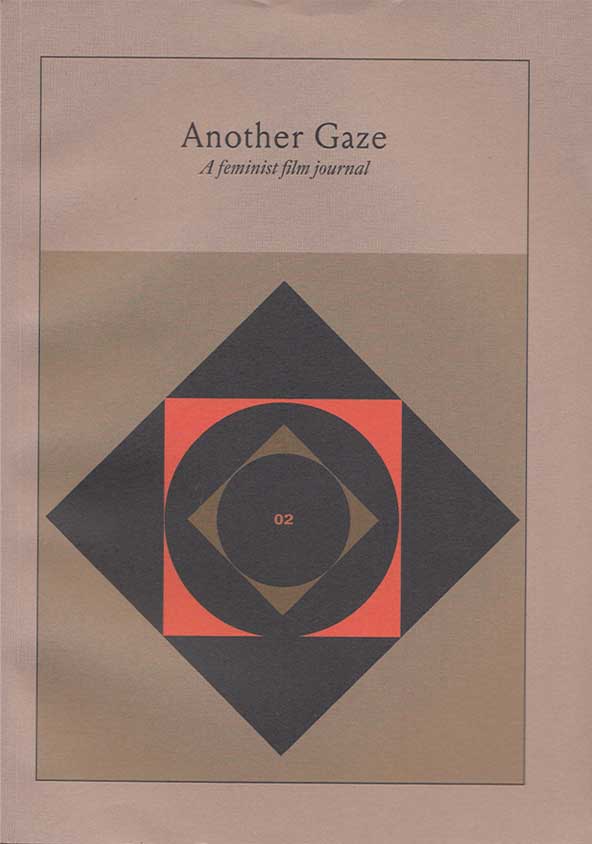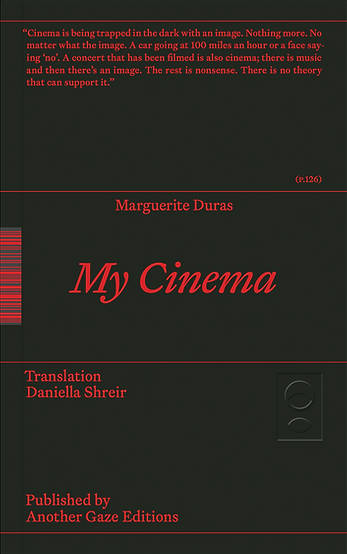
Another Gaze Journal 02
Daniella Shreir ed.
Including essays about Lucrecia Martel, Alice Rohrwacher, Cecilia Mangini, Chantal Akerman, Mika Rottenberg, Anocha Suwichakornpong, Agnès Varda, Barbara Hammer, Laida Lertxundi.

Daniella Shreir ed.
Including essays about Lucrecia Martel, Alice Rohrwacher, Cecilia Mangini, Chantal Akerman, Mika Rottenberg, Anocha Suwichakornpong, Agnès Varda, Barbara Hammer, Laida Lertxundi.

A visual anthology compiling the contributions of the filmmakers who are part of the Light Cone collection, a key institution for the distribution, promotion and preservation of experimental cinema in France and around the world, on the occasion of its 40th anniversary.
2022 marks an important moment for Light Cone: its 40th anniversary. Such an event should be celebrated in the best possible way. Light Cone has come together thanks to the filmmakers whose films entered the collection over the years. We've decided to invite them to participate in an editorial project, a book in which we would publish their contributions: letters, postcards, photographs, drawings, film stills, collages, etc., which they have sent us for the occasion of the anniversary. A collective scrapbook in which the materiality of the objects—paper, photos, colors, handwritten notes—evokes that of analog cinema, which we have always defended. A book of images is born, and through the creation of this micro-collection, so is a portable museum of about one hundred pieces, which are ready to be exhibited and which will remain in the care of Light Cone's archive.
With Michel Amarger, Martin Arnold, Caroline Avery, Peter-Conrad Beyer, Giuseppe Boccassini, Patrick Bokanowski, Louise Bourque, Robert Breer, Dietmar Brehm, Claudio Caldini, Stefano Canapa, Abigail Child, Pip Chodorov, Martha Colburn, Philippe Cote, Sandra Davis, Frédérique Devaux, Karel Doing, Anja Dornieden, Flatform, Cécile Fontaine, Olivier Fouchard, Su Friedrich, Siegfried Alexander Fruhauf, Peter Gidal, Milena Gierke, Christoph Girardet, Juan David, Gonzalez Monroy, Christophe Guérin, Nicky Hamlyn, Barbara Hammer, Teo Hernandez, Tony Hill, Mike Hoolboom, Jakobois, Larry Jordan, Patrice Kirchhofer, Maria Kourkouta, Alexandre Larose, Christian Lebrat, Emmanuel Lefrant, Maurice Lemaître, Jeanne Liotta, Rose Lowder, Johann Lurf, Pablo Marín, Mara Mattuschka, Bruce Mcclure, Miles Mckane, Luc Meichler, Barbara Meter, Peter Miller, Matthias Müller, Michel Nedjar, Dominique Noguez, Vivian Ostrovsky, Simon Payne, Emmanuel Piton, Charlotte Pryce, Gisèle Rapp-Meichler, Abraham Ravett, Emily Richardson, D.N. Rodowick, Gaëlle Rouard, Martine Rousset, Pierre Rovere, Ben Russell, Daïchi Saïto, Maki Satake, Sylvia Schedelbauer, Jeff Scher, Stanley Schtinter, Guy Sherwin, José Antonio Sistiaga, John Smith, Vicky Smith, Michael Snow, Malena Szlam, Mika Taanila, Marcelle Thirache, Trinh T. Minh-ha, David Wharry, Telemach Wiesinger, Antoinette Zwirchmayr.

A collection of writings by and interviews with Duras about her filmmaking, first published in French by P.O.L. in 2021 and translated into English by Daniella Shreir.
Working chronologically through her nineteen films, made between 1966 and 1985, this collection of reflections by Marguerite Duras (1914–1996) includes non-standard press releases, notes to her actors, letters to funders, short essays on themes as provocatively capacious as ‘mothers’ and ‘witches’, as well as some of the most significant interviews she gave about her cinematic and writing practices (with filmmakers and critics including Jacques Rivette, Caroline Champetier and Jean Narboni).
In Duras's hands, all of these forms turn into a strange, gnomic literature in which the boundary between word and image becomes increasingly blurred and the paradox of creating a cinema that seeks ‘to destroy the cinema’ finds its most potent expression.
Yet, Duras is never concerned only with her own work, or even with the broader project of making cinema: her preoccupations are global, and the global crucially informs her perceptions of the way in which she works. With the audiovisual as a starting point, her encyclopaedic associative powers bring readers into contact with subjects as diverse as the French Communist Party, hippies, Jews, revolutionary love, madness and freedom, across four decades of an oeuvre that is always in simultaneous dialogue with the contemporary moment and world history.
MARGUERITE DURAS (1914–1996) published over forty novels, numerous essays, novellas and plays and made nineteen films. She was part of the French Resistance, joined then left the Communist Party, and actively protested against the war in Algeria. She collaborated repeatedly with actors including Jeanne Moreau, Delphine Seyrig and Gerard Depardieu. Her films speak of her childhood in Indochina and the French colonies, of desire (burning and frustrated), madness and domesticity. Contemporary filmmakers including Claire Denis, Alice Diop and John Waters have cited Duras’ cinema as inspiration for their own work.

In the fifth published title of the Decadent Editions series, Christine Smallwood explores Chantal Akerman’s adaptation of Marcel Proust’s The Prisoner, the fifth volume of In Search of Lost Time, in a text that moves elegantly between Akerman’s films, Proust’s novel, and Smallwood’s own life.

De vijde Nederlandstalige GLEAN editie.
Bijdrages over Chantal Akerman, Biënnale van Venetië, Eline de Clercq, Samah Hijawi, Laure Prouvost, Anastasia Bay, Wim Delvoye, Riar Rizaldi, Haegue Yang, Nil Yalter, Anna Maria Mariolino.

Searing in its energies and mysterious in its icy depths, Love is Colder than the Lake is a tour-de-force of the experimental French poet Liliane Giraudon's power and range.
Love is Colder than the Lake weaves together stories dreamed and experienced, fragments of autobiographical trauma, and scraps of political and sexual violence to create an alchemical and incantatory texture that is all Giraudon's own. In its feminist attention and allusive stylistic registers, Love is Colder than The Lake claims a unique position among contemporary French literature. The heroes (or anti-heroes) in this collection include Rainer Werner Fassbinder, Lorine Niedecker, Emma Goldman, Chantal Akerman, the Marquis de Sade, and the unnamed lake itself. Giraudon's writing, editing, and visual work have been influential in France for decades, and English-speaking readers will thrill to this challenging, important voice.
Liliane Giraudon was born in Marseille in 1946. She continues to live and work in Marseille, and her writing is inseparable from the place, shaped by the vibrant community of poets and writers and artists Giraudon has herself shaped, as well as by the city's gritty and diverse cosmopolitanism. Giraudon's many books have, since 1982, been primarily published by France's P.O.L. editions. Giraudon has also been instrumental as an editor for influential reviews such as Banana Split, Action Poétique, and If. She performs and collaborates widely, including with Nanni Balastrini, Henri Delui, Jean-Jacques Viton, and many others. Two of her books ( Fur and Pallaksh, Pallaksh) were published in English by Sun & Moon Press in 1992 and 1994, respectively. She lives in Marseille, France.
Lindsay Turner is the author of the poetry collections Songs & Ballads (Prelude Books, 2018) and The Upstate (University of Chicago Press, 2023). She has twice received French Voices awards for her translations from the French, which include books of poetry and philosophy by Stéphane Bouquet, Souleymane Bachir Diagne, Anne Duforumantelle, Ryoko Sekiguchi, and others. She is Assistant Professor of English and Creative Writing at Case Western Reserve University in Cleveland, Ohio.
Sarah Riggs is a poet and multivalent artist. Her most recent book The Nerve Epistle appeared in 2021. Translation is one of her arts, for which she received a Griffin prize with Etel Adnan, and Best Translated Book Award, also for Adnan's Time (Nightboat, 2019). Riggs lives in Brooklyn, after many years in Paris. Author residence: Marseille, France.
![Cover of OEI #94-95 Geografier [Geographies]](https://rile.space/storage/1488/0216_Scan2022-04-15_140650_004.jpg)
Jonas J. Magnusson, Cecilia Grönberg and 1 more
The new publication triangulates between geopoetics, geopolitics, and cultural geography; a 464 page issue with some 50 contributors as well as a large section on Swedish philosophical geographer Gunnar Olsson.

Tomas Sidoli, Emmanuel Régniez and 1 more
Avec les poèmes et traductions de: Pierre Escot, Marine Forestier, Adrien Lafille, Alexis Aurdren, Maud Joiret.
Édition: Thomas Le Goff, Emmanuel Régniez, Tomas Sidoli.
Les éditions du quelconque se divisent en deux projets, une maison d'édition (à venir) et une revue, Un Rectangle Quelconque. Cette dernière, chaque semestre, propose de découvrir des auteurs de poésie venant de tous horizons géographiques et esthétiques. La maison d'édition, elle, sera l'occasion de présenter aux lecteurs francophones des nouvelles voix de la poésie actuelle.

A text on speaking, listening and being understood made in conversation with iOS speech-to-text software.